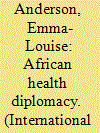|
|
|
Sort Order |
|
|
|
Items / Page
|
|
|
|
|
|
|
| Srl | Item |
| 1 |
ID:
159973


|
|
|
|
|
| Summary/Abstract |
Health crises pose fundamental challenges to international relations and have been a major focal point of contests for global influence, particularly in the global South, where such crises are most acute. This necessitates a focus on the arenas of global health diplomacy and the power struggles that emanate from them, including the often-overlooked agency of African actors within these arenas. Drawing upon a total of 3 months of fieldwork in 2007 and 2014 that included 68 key-informant interviews, participant observations, and informal discussions, this article interrogates the mechanics of multi-stakeholder health diplomacy in Malawi, where a near-permanent state of health crisis and underdevelopment has generated extreme dependency on external health assistance. This article conceptualises shadow diplomacy as the informal networks and channels of influence that run parallel to, but are not recognised as part of, formal diplomacy. This concept reveals how health is key to struggles for leverage by both international and local actors, giving rise to informal and subversive manifestations of diplomacy in the ‘shadows’. It enables us to understand not only how Western powers consolidate and obscure their enduring power but also how the ‘shadows’ benefit African political elites as they leverage their dependency to subvert global power structures for their own ends. It disrupts the external/internal binary of international donors/African states and reveals that these are not monolithic actors but instead comprising complex individuals with multi-faceted motivations and divided loyalties.
|
|
|
|
|
|
|
|
|
|
|
|
|
|
|
|
| 2 |
ID:
144246


|
|
|
|
|
| Summary/Abstract |
This article identifies the long-term political factors that contributed to the Ebola crisis in Sierra Leone, factors which are largely overlooked by the emerging international focus on building resilient health systems. We argue that the country exhibits critical symptoms of the recurrent crises of a gatekeeper state, including acute external dependency, patron–client politics, endemic corruption and weak state capacity. A coterie of actors, both internal and external to Sierra Leone, has severely compromised the health system. This left certain sections of the population acutely at risk from Ebola and highlights the need for political solutions to build stronger, inclusive health systems.
|
|
|
|
|
|
|
|
|
|
|
|
|
|
|
|
| 3 |
ID:
155483


|
|
|
|
|
| Summary/Abstract |
Based on 16 months of fieldwork conducted in Malawi and Zambia between 2005 and 2014, this article advances debates on North–South relations by providing an actor-oriented view of donor politics. Drawing upon 152 interviews, 104 focus group discussions and a series of observations, it demonstrates how local people instrumentalize the fuzziness of ‘empowerment’ discourses to gain resources, status and opportunities. Our analysis of how local people push back against top-down dictated policies and structures in international affairs is highly pertinent because of Africa's extreme dependency on external resources for the AIDS response. We argue that the malleability of ‘empowerment’ in the AIDS enterprise has strategic advantages for seemingly dependent people living with HIV. Through ‘performances of compliance’ that mimic dominant ideologies, ‘extraversion’ that plays up recipients' weakness in global structures, and silence and humour that extend beyond the limits of the spoken word, locals embrace the elasticity of ‘empowerment’ and show agency despite the constraints of poverty, aid dependence, hunger and unemployment. These actions close the space for actual transformation of local people's lives because they create power imbalances within communities, privileging some while silencing and disadvantaging others.
|
|
|
|
|
|
|
|
|
|
|
|
|
|
|
|
| 4 |
ID:
180346


|
|
|
|
|
| Summary/Abstract |
Trust between actors is vital to delivering positive health outcomes, while relationships of power determine health agendas, whose voices are heard and who benefits from global health initiatives. However, the relationship between trust and power has been neglected in the literatures on both international politics and global health. We examine this relationship through a study of relations between faith based organisations (FBO) and donors in Malawi and Zambia, drawing on 66 key informant interviews with actors central to delivering health care. From these two cases we develop an understanding of ‘trust as belonging’, which we define as the exercise of discretion accompanied by the expression of shared identities. Trust as belonging interacts with power in what we term the ‘power-trust cycle’, in which various forms of power undergird trust, and trust augments these forms of power. The power-trust cycle has a critical bearing on global health outcomes, affecting the space within which both local and international actors jockey to influence the ideologies that underpin global health, and the distribution of crucial resources. We illustrate how the power-trust cycle can work in both positive and negative ways to affect possible cooperation, with significant implications for collective responses to global health challenges.
|
|
|
|
|
|
|
|
|
|
|
|
|
|
|
|
|
|
|
|
|